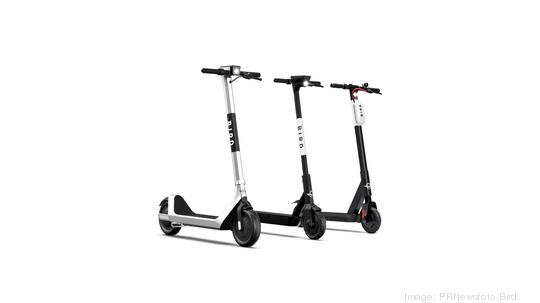
The number of e-scooter rides in Chicago’s second pilot are on par with ridership last year even though there are four times as many scooters available citywide, reflecting changing commuting patterns amid the Covid-19 pandemic.
Within the first month of this year's pilot, which began Aug. 12, there have been more than 230,400 scooter trips logged in 2020 compared to 218,000 trips in the first month of the 2019 pilot, according to data from the Chicago Department of Transportation and Department of Business Affairs and Consumer Protection.
On average, 1.42 trips are taken per day per device, compared to 4.76 trips in 2019.
Vendors participating in this year’s pilot are Lime, Bird and Spin.
The similar ridership trend comes as this year’s pilot, which ends in mid-December, includes four times as many scooters as 2019’s, totaling about 10,000 scooters throughout the city.
This year scooters are also spread out closer to Chicago's downtown area and across Northside neighborhoods, as opposed to mainly being located in South and West Side areas in 2019.
Though ridership has been stagnant in 2020, average trip lengths are longer. The average trip has been 1.87 miles, which is 34% longer than during the first month of the 2019 pilot.
New to this year’s pilot is the requirement that e-scooters are equipped with locks so they can be secured to bike racks, street signs and other fixed objects. The idea is to cut down on street and sidewalk clutter that was the source of many complaints last year.
In 2020, with the addition of locks to the e-scooter program, complaints are down 60%, totaling 311.
“While initial demand is lower than last year’s pilot, we are encouraged by both the data and anecdotal reports from residents, advocates and City staff that indicate the lock-to cable requirement has significantly reduced the number of instances of devices blocking sidewalks,” said CDOT Commissioner Gia Biagi in a statement.
The pilot requires vendors to deploy 50% of their scooters to priority areas on the city’s South and West Sides. Through the first month of the pilot, scooter operators fell just short of that mark with a daily average of 49.3% of devices being deployed to priority areas.
BACP has issued a total of 14 rule violation notices to the three vendor companies, with Bird and Lime each receiving five.
Violation notices are given to vendors for things like failing to relocate scooters parked outside of pilot area within two hours of notification and failing to have an operational warning bell on one or more scooters.
The city will also soon begin requiring each scooter vendor to include educational hang-tags with devices for the remainder of the pilot so riders know how to use them properly.
Besides being locked to a fixed object when unused, e-scooters are limited to 15 mph, cannot be ridden on sidewalks, and can only operate from 5 a.m. to 10 p.m. Riders are required to use bike lanes and obey all traffic laws.
The city said it aims to use this pilot to identify ways to expand access to safe, reliable and equitable mobility options for Chicagoans. The long-term goal of the second pilot is to determine if Chicago can create a permanent scooter-sharing license.
“We are encouraged by the results of the first month but continue to work to hold the companies accountable to our strict terms and requirements,” said BACP Commissioner Rosa Escareño in a statement. “This pilot was designed thoughtfully and carefully to test this new mobility option, and we will continue this pilot proactively and diligently.”



